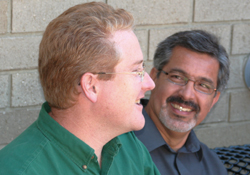CAS Student Learning Outcomes
The Higher Education Administration program adopts the Student Learning and Development Outcomes developed by the Council for the Advancement of Standards in Higher Education (CAS), as exemplified below.
Intellectual growth: Produces personal and educational goal statements; employs critical thinking in problem solving; uses complex information from a variety of sources including personal experience and observation to form a decision or opinion; obtains a degree; applies previously understood information and concepts to a new situation or setting; expresses appreciation for literature, the fine arts, mathematics, sciences, and social sciences. Effective communication: Writes and speaks coherently and effectively; writes and speaks after reflection; able to influence others through writing, speaking or artistic expression; effectively articulates abstract ideas; uses appropriate syntax; makes presentations or gives performances.
Effective communication: Writes and speaks coherently and effectively; writes and speaks after reflection; able to influence others through writing, speaking or artistic expression; effectively articulates abstract ideas; uses appropriate syntax; makes presentations or gives performances.
Enhanced self-esteem: Shows self-respect and respect for others; initiates actions toward achievement of goals; takes reasonable risks; demonstrates assertive behavior; functions without need for constant reassurance from others.
Realistic self-appraisal: Articulates personal skills and abilities; makes decisions and acts in congruence with personal values; acknowledges personal strengths and weaknesses; articulates rationale for personal behavior; seeks feedback from others; learns from past experiences.
Clarified values: Articulates personal values; acts in congruence with personal values; makes decisions that reflect personal values; demonstrates willingness to scrutinize personal beliefs and values; identifies personal, work, and lifestyle values and explains how they influence decision-making.
Career choices: Articulates career choices based on assessment of interests, values, skills and abilities; documents knowledge, skills and accomplishments resulting from formal education, work experience, community service, and volunteer experiences; makes the connections between classroom and out-of-classroom learning; can construct a resume with clear job objectives and evidence of related knowledge, skills, and accomplishments; articulates the characteristics of a preferred work environment; comprehends the world of work; takes steps to initiate a job search or seek advanced education.
Leadership development: Articulates leadership philosophy or style; serves in a leadership position in a student organization; comprehends the dynamics of a group; exhibits democratic principles as a leader; exhibits ability to visualize a group purpose and desired outcomes.
Healthy behavior: Chooses behaviors and environments that promote health and reduce risk; articulate the relationship between health and wellness and accomplishing life long goals; exhibits behaviors that advance a healthy community.
Meaningful interpersonal relationships: Develops and maintains satisfying interpersonal relationships; establishes mutually rewarding relationships with friends and colleagues; listens to and considers others’ points of view; treats others with respect.
Independence: Exhibits self-reliant behaviors; functions autonomously; exhibits ability to function interdependently; accepts supervision as needed; manages time effectively.
Collaboration: Works cooperatively with others; seeks the involvement of others; seeks feedback from others; contributes to achievement of a group goal; exhibits effective listening skills.
Social responsibility: Understands and participates in relevant governance systems; understands, abides by, and participates in the development, maintenance, and/or orderly change of community, social, and legal standards or norms; appropriately challenges the unfair, unjust, or uncivil behavior of other individuals or groups; participates in service/volunteer activities.
Satisfying and productive lifestyles: Achieves balance between education, work and leisure time; articulates and meets goals for work, leisure and education; overcomes obstacles that hamper goal achievement; functions on the basis of personal identity, ethical, spiritual and moral values; articulates long-term goals and objectives.
Appreciating diversity: Understands one's own identity and culture; seeks involvement with people different from oneself; seeks involvement in diverse interests; articulates the advantages and challenges of a diverse society; challenges appropriately abusive use of stereotypes by others; understands the impact of diversity on one’s own society.
Spiritual awareness: Develops and articulates personal belief system; understands roles of spirituality in personal and group values and behaviors.
Personal and educational goals: Sets, articulates, and pursues individual goals; articulates personal and educational goals and objectives; uses personal and educational goals to guide decisions; understands the effect of one’s personal and education goals on others.

